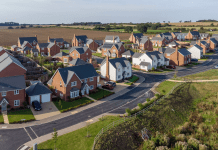The right homes, in the right place, for the right price. Tackling the housing crisis is more than just a numbers game. Kate Henderson, new chief executive of the National Housing Federation, sets out the challenges we need to address to create truly sustainable communities
Since taking over as the chief executive of the National Housing Federation last year, I have had a great opportunity to travel around the country, meeting our members – the housing associations that provide homes for more than six million people – and their tenants.
I’ve also seen first-hand the desperate need for more affordable housing in this country. I have visited homeless hostels, heard stories of people stuck for years in so-called temporary accommodation and private renters who have given up hope that they will ever be able to find somewhere stable to live.
This is the human cost of the housing crisis. Our research shows that we are short of four million homes in England, and these are the impacts of that shortfall. We need to build 340,000 new homes every year to meet this shortfall. But it’s not just a numbers game – what is more important is the type of homes that are built. Our research shows that 90,000 of these need to be for social rents to make sure that everyone can have a home that they can afford.
Of course, this is not a straightforward process – the roots of the housing crisis go back decades, and tackling them will take time. But it is encouraging to see the housing crisis high on the political agenda. In her speech to our National Housing Summit last year, the Prime Minister recognised that housing associations are vital to solving the housing crisis, and promised more funding to support them.
What was so significant about this funding was not the £2bn that the government has earmarked for affordable housing, welcome though it is. Rather, it is the fact that the money will be available over a decade, allowing housing associations to plan for the long term. This was the true value of the Prime Minister’s vote of confidence in housing associations. Now the sector is keen and ready to deliver.
How do we do this?
We need to find new, innovative approaches. The recent waves of strategic partnerships between housing associations and Homes England are a great example. This new approach to investing in affordable housing guarantees a long-term funding pipeline for housing associations, allowing them to build the right homes in the right places.
Housing associations have also done great work partnering with other organisations, including local councils, private developers and funders. By working together, these organisations can magnify their own impact, unlocking development and delivering more of the homes that the country badly needs.
However, simply giving housing associations more grant funding will not solve every problem. Increasingly, housing associations do not want to rely on Section 106 agreements with private developers – instead, they want to take control of what is built. But, in order to do this, housing associations need land.
The high cost of land is one of the biggest challenges holding back the delivery of social housing. Our recent research shows that land becomes 275 times more expensive on average once it is granted planning permission. This means that ever-more expensive homes need to be built to cover the cost, and so building affordable housing becomes all but impossible.
To address this, we need to fundamentally change the way that land is bought and sold in this country. When land is granted planning permission and its value increases, more of this uplift should be captured to invest in vital infrastructure, especially affordable housing. After all, it is the community that grants planning permission, via elected councillors – so why shouldn’t the community see more of the benefits that come with development?
Ultimately, this is what it comes down to creating sustainable communities. Of course, building new homes is a major part of this picture, but it is not the only thing that matters. Housing associations also have a major role to play in supporting existing communities. They are major economic players and are driven by a social purpose – this is a potent combination.
There is a desperate shortage of affordable housing in the UK. People are waking up to this and recognising that urgent steps need to be taken. We are happy to see positive developments like increased funding and longer-term partnerships with the government and other organisations. But more must be done to make sure that everyone can live in a quality home that they can afford.

Kate Henderson
Chief Executive
Tel: +44 (0)20 7067 1010
Twitter: natfednews
Linkedin: national-housing-federation
Facebook: nationalhousingfederation
Instagram: national.housing.federation

















